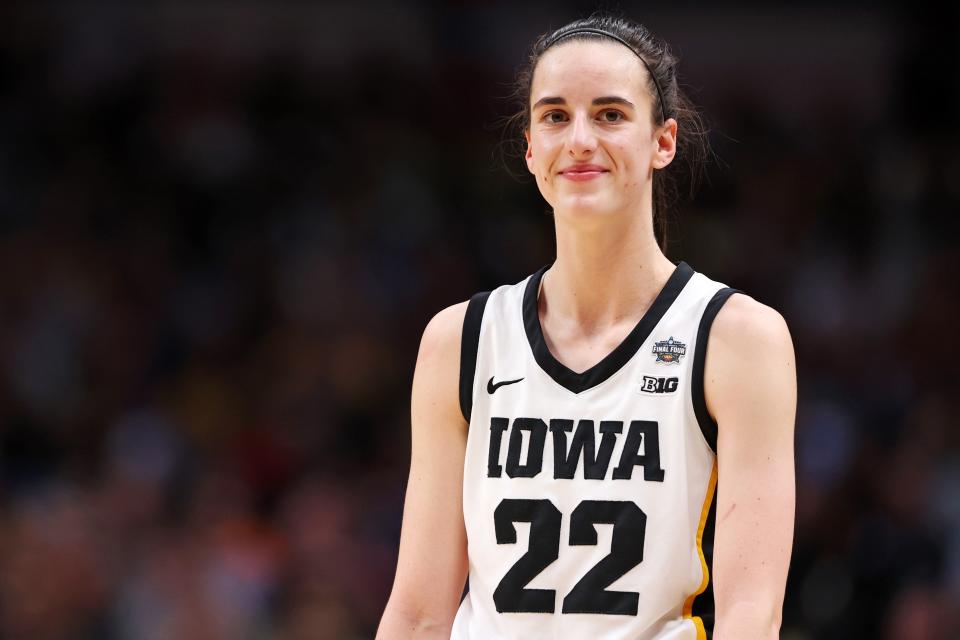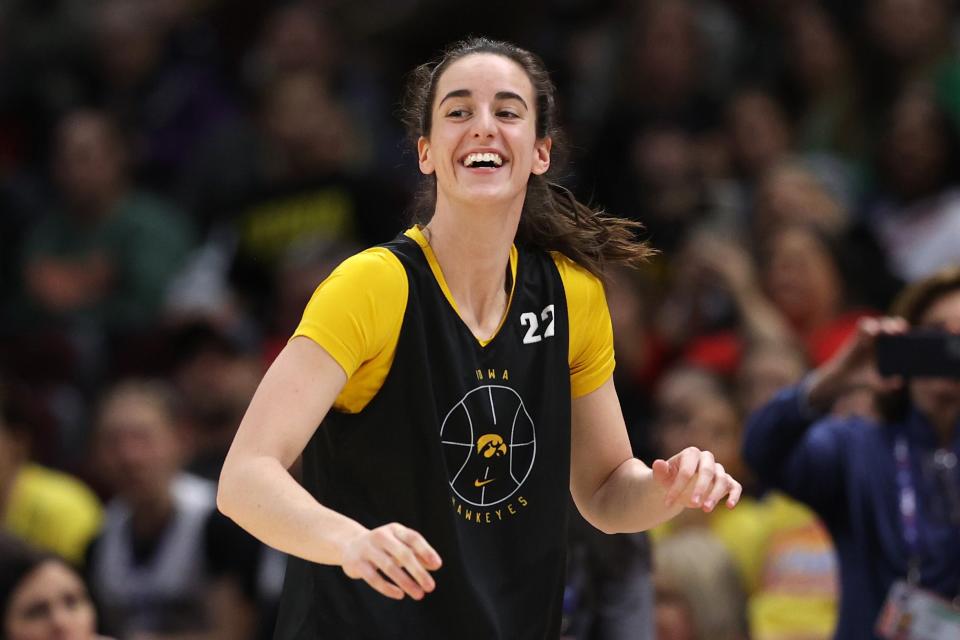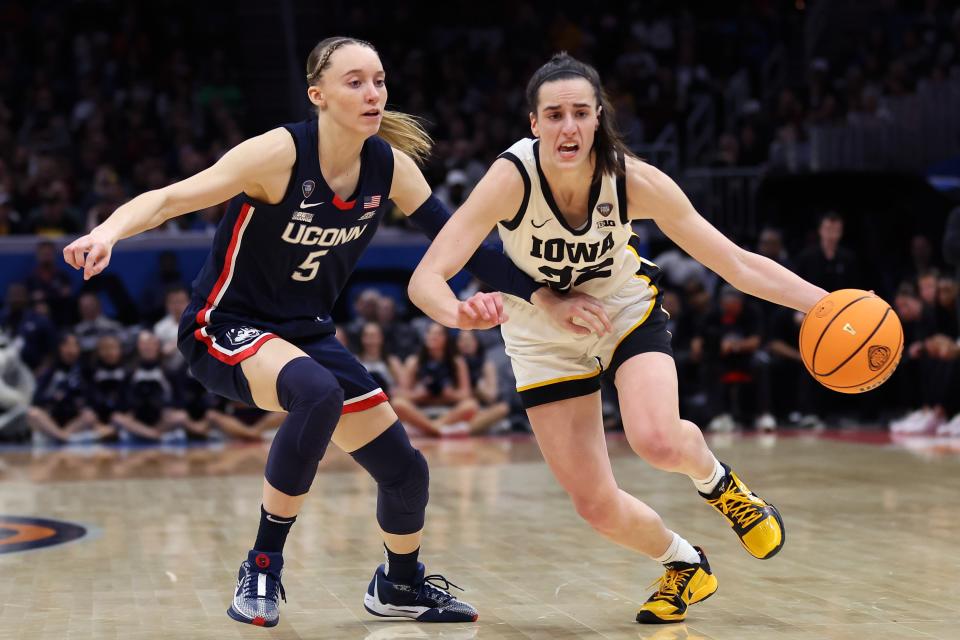Caitlin Clark Is Changing Women’s Sports. Is It Enough?

Maddie Meyer/Getty Images
You don’t have to be a sports fan to have noticed something epic is happening in women’s basketball.
Call it the Caitlin Clark effect, the phenomenon named for the University of Iowa guard who completely reshaped the college basketball landscape this season. The Hawkeye sold tickets across the country, went viral every time she stopped to sign autographs for swarms of kids lined up to see their favorite athlete, and broke a dozen records—including the all-time scoring record for college basketball and the record for most three-pointers in a single season (previously held by Davidson College alum Steph Curry, now a point guard for the Golden State Warriors and widely considered to be the greatest shooter to ever play the game).
Clark was also at least partially responsible for the fact that, for the first time in history, the viewership numbers for the women’s March Madness tournament crushed the viewership for the men’s tournament—by millions. Nearly 19 million people watched Clark and the Hawkeyes take on the legendary coach Dawn Staley and the South Carolina Gamecocks during the championship game on Sunday. It was the most watched basketball game—women’s or men’s, college or pro—in five years, according to ESPN.
Sports
The 22-year-old college basketball player has some thoughts about her record-breaking legacy.
Just three short years ago, during Clark’s freshman year, the vibe in women’s college basketball was very different.
You may remember the viral photos and videos of the grossly unequal conditions between the men’s and women’s March Madness tournaments in 2021. Women athletes had inferior training facilities, inferior marketing, even inferior swag bags from the NCAA.
An independent investigation of the reported inequalities at the tournament found the NCAA had created a culture that “prioritized Division I men’s basketball over everything else in ways that create, normalize, and perpetuate gender inequities” and that the organization perpetuated “a mistaken narrative that women’s basketball is destined to be a ‘money loser’ year after year.”
In the fallout, things began to change. The women’s tournament was finally granted the right to use the bankable March Madness branding, media outlets increased their coverage, games appeared on TV.
Sports News
This is sports(wo)manship.
The environment, in other words, was ideal for a once-in-a-generation athlete like Clark to come in and make people remember why sports have such unifying power. “When you’re given an opportunity, women’s sports just kind of thrives,” Clark said, per the Associated Press. “We started our season playing in front of 55,000 people in Kinnick Stadium, and now we’re ending it playing in front of probably 15 million people or more on TV. It just continues to get better and better and better. That’s never going to stop.”
The hype surrounding Clark (championship title or no championship title) doesn’t have to stop. Sports economists and pundits are already discussing her impact on the WNBA, a league Clark hasn’t even played for yet.
Tickets for Indiana Fever games—the team Clark is expected to join as the number one draft pick on April 15—are selling at record highs, and two WNBA teams have already reportedly moved their games against Indiana to bigger arenas to accommodate the expected crowds. NCAA champions Angel Reese of Louisiana State University (2023) and Kamilla Cardoso of the University of South Carolina (2024) have also entered the draft. The combined presence of these athletes with their huge social media presence and ability to draw fans into games could “transform” the league and help the WNBA double its current media rights deal, said commissioner Cathy Engelbert in an interview with CNBC.
The Caitlin Clark effect really isn’t about Caitlin Clark at all—at least no more than it is about Billie Jean King, or Serena Williams, or the USWNT in soccer, or all the other women who have come before her. If you’ve been paying attention to the momentum building in women’s sports, it’s clear that progress is never about just one athlete, one team, one championship, or one equal pay deal.
The culture-shifting hype surrounding women’s college basketball this season is the result of the collective actions of women in sports building on the work of the previous generation. And Clark is the perfect example of why that matters. She’s among the first generation of women for whom the WNBA has always existed (the league was founded just a few years before she was born), the first generation to grow up seeing women’s basketball as a potential career path.
I wrote about the power of women in sports and their ability to shape our perceptions about possibilities for women in my book Money, Power, Respect: How Women in Sports Are Shaping the Future of Feminism. Since it was published, I’m often asked two questions: Have we reached the tipping point for equality in sports?And what does real transformation look like?
Equality for women’s sports starts with equal opportunity, equal pay, and equal investment. But that’s only the minimum. Beyond that, it's about equal excitement. It’s about women’s sports being as much of a cultural phenomenon as men’s—as likely to be talked about in the office on Monday, as likely to be watched just to see the commercials, as likely to turn into a Taylor Swift sighting.
Sports
A controversial foul call put a bit of a damper on the victory for many viewers.
“When the top brass is around the men’s game, their fricking hair is falling out [in excitement]. They’re having the time of their life. That’s what I see as equality,” Megan Rapinoe told me for my book. “It’s not just in the numbers. It’s not just in how much we’re paid. It’s in the attitude and the way both teams are taken care of on and off the field.” That’s the tipping point. That’s when we’ll know we’re on the path to real equality.
We’ve seen epic athletes before. We’ve seen dominant wins, we’ve seen history-making records. There are so many moments in sports history, not so dissimilar to this one, that should have been the tipping point. But time after time, the excitement fades.
The Caitlin Clark effect—the unprecedented respect and excitement surrounding women’s basketball—could not have happened if generations of women across sports hadn't been fighting for every inch of progress that got us to this moment. And that’s what makes it feel different. This season of women’s college basketball showed us what’s possible. It’s up to us to keep up the momentum.
Macaela MacKenzie is a Glamour contributor and the author of Money, Power, Respect: How Women in Sports Are Shaping the Future of Feminism. Follow her on Instagram @macaelamac.
Originally Appeared on Glamour




